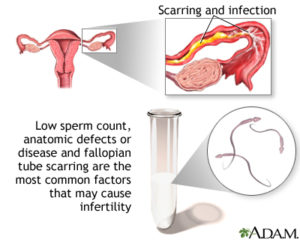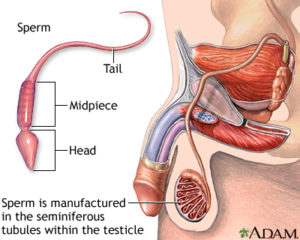Infertility |
||
DefinitionInfertility means you cannot get pregnant (conceive). There are 2 types of infertility:
Alternative NamesInability to conceive; Unable to get pregnant CausesMany physical and emotional factors can cause infertility. It may be due to problems in the woman, man, or both. FEMALE INFERTILITY Female infertility may occur when:
Female infertility may be caused by:
MALE INFERTILITY Male infertility may be due to:
Male infertility can be caused by:
Healthy couples under age 30 who have sex regularly will have a 25% to 30% per month chance of getting pregnant each month. A woman is most fertile in her early 20s. The chance a woman can get pregnant drops greatly after age 35 (and especially after age 40). The age when fertility starts to decline varies from woman to woman. Infertility problems and miscarriage rates increase significantly after 35 year of age. There are now options for early egg retrieval and storage for women in their 20’s. This will help ensure a successful pregnancy if childbearing is delayed until after age 35. This is an expensive option, but for women who know they will need to delay childbearing, it may be worth considering. Exams and TestsDeciding when to get treated for infertility depends on your age. Health care providers often suggest that women under 30 try to get pregnant on their own for 1 year before getting tested. Many experts recommend that women over 35 attempt conception for only 6 months. If a pregnancy does not occur within that time, they should talk to their provider. Infertility testing involves a medical history and physical exam for both partners. Blood and imaging tests are most often needed. In women, these may include:
Tests in men may include:
TreatmentTreatment depends on the cause of infertility. It may involve:
Couples can increase the chances of becoming pregnant each month by having sex at least every 3 days before and during ovulation. Ovulation occurs about 2 weeks before the next menstrual cycle (period) starts. Therefore, if a woman gets her period every 28 days the couple should have sex at least every 3 days between the 10th and 18th day after her period starts. Having sex before ovulation occurs is especially helpful.
Women who are under or overweight may increase their chances of becoming pregnant by getting to a healthier weight. Support GroupsMany people find it helpful to take part in support groups for people with similar concerns. You can ask your provider to recommend local groups. Outlook (Prognosis)As many as 1 in 5 couples diagnosed with infertility eventually become pregnant without treatment. More than half of couples with infertility become pregnant after treatment. This figure does not include advanced techniques such as in vitro fertilization (IVF). When to Contact a Medical ProfessionalCall your provider if you are unable to get pregnant. PreventionPreventing sexually transmitted infections (STIs), such as gonorrhea and chlamydia, may reduce your risk of infertility. Maintaining a healthy diet, weight, and lifestyle may increase your chance of getting pregnant and having a healthy pregnancy. ReferencesAmerican Society for Reproductive Medicine. Diagnostic evaluation of the infertile female: a committee opinion. Fertil Steril. 2012;98:302-307. PMID: 22698637 www.ncbi.nlm.nih.gov/pubmed/22698637. American Society for Reproductive Medicine. Diagnostic evaluation of the infertile male: a committee opinion. Fertil Steril. 2015;103:18-25. PMID: 25597249 www.ncbi.nlm.nih.gov/pubmed/25597249. Barak S, Baker HWG. Clinical management of male infertility. In: Jameson JL, De Groot LJ, de Kretser DM, et al, eds. Endocrinology: Adult and Pediatric. 7th ed. Philadelphia, PA: Elsevier Saunders; 2016:chap 141. Broekmans FJ, Fauser BCJM. Female infertility. In: Jameson JL, De Groot LJ, de Kretser DM, et al, eds. Endocrinology: Adult and Pediatric. 7th ed. Philadelphia, PA: Elsevier Saunders; 2016:chap 132. Lobo RA. Infertility: etiology, diagnostic evaluation, management, prognosis. In: Lentz GM, Lobo RA, Gershenson DM, Katz VL, eds. Comprehensive Gynecology. 6th ed. Philadelphia, PA: Elsevier Mosby; 2012:chap 41. Rebar RW, Catherino WH. Reproductive endocrinology and infertility. In: Goldman L, Schafer AI, eds. Goldman’s Cecil Medicine. 25th ed. Philadelphia, PA: Elsevier Saunders; 2016:chap 236. |


